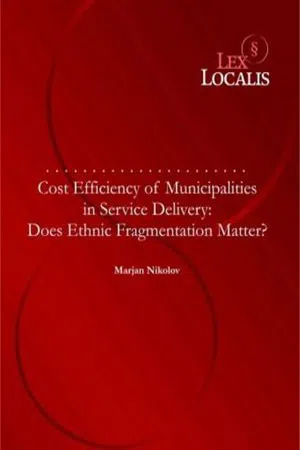
Cost Efficiency of Municipalities in Service Delivery : Does Ethnic Fragmentation Matter?
- English
- PDF
- Available on iOS & Android
Cost Efficiency of Municipalities in Service Delivery : Does Ethnic Fragmentation Matter?
About this book
Driven by the Ohrid Framework Agreement (OFA), decentralisation in Macedonia is a policy choice for spurring national cohesion rather than an economic instrument for the more efficient delivery of services. The OFA resulted in a new Macedonian Constitution with policies related to the decentralisation process and equitable representation of communities. This book aims first to estimate the spending efficiency of Macedonian municipalities in service delivery from their own resources and, second, to ascertain the determinants of that efficiency. The ethnic fragmentation of municipalities is taken into account as a possible determinant of efficiency, which represents a novelty in such types of studies. We employ the DEA-VRS, Kernel and SFA estimation techniques to control for the robustness of our estimates. Our findings show that on average Macedonian municipalities exhibit low efficiency in service delivery, although there are significant variations among municipalities. The ethnic fragmentation of municipalities together with the population density, own tax revenues and political affiliation of the mayor with the leading political coalition at the state level explain differences in their efficiencies. More fragmented municipalities tend to be less efficient when providing services to citizens.
Frequently asked questions
- Essential is ideal for learners and professionals who enjoy exploring a wide range of subjects. Access the Essential Library with 800,000+ trusted titles and best-sellers across business, personal growth, and the humanities. Includes unlimited reading time and Standard Read Aloud voice.
- Complete: Perfect for advanced learners and researchers needing full, unrestricted access. Unlock 1.4M+ books across hundreds of subjects, including academic and specialized titles. The Complete Plan also includes advanced features like Premium Read Aloud and Research Assistant.
Please note we cannot support devices running on iOS 13 and Android 7 or earlier. Learn more about using the app.
Information
Table of contents
- COST EFFICIENCY OF MUNICIPALITIES IN SERVICE DELIVERY: DOES ETHNIC FRAGMENTATION MATTER? by Marjan Nikolov
- ABSTRACT
- KEYWORDS
- Marjan Nikolov, Ph. D.: Author Biography
- Foreword
- Contents
- Introduction
- Macedonia and the Transition
- 1 Macedonia in Yugoslavia
- 2 Monetary independence, transition, restructuring and macroeconomic performance
- 3 Structural changes in the Macedonian economy: The legacy of the transition
- 4 The Ohrid Framework Agreement and the new Macedonian constitution of 2001
- 4.1 History of the Macedonian and Albanian relationship
- 4.2 The OFA and the constitution after the OFA
- 5 Socio-economic differences in Macedonia at the regional level
- Theoretical Consideration of Decentralisation
- 1 Decentralisation theory
- 2 Public service delivery in an ethnically diverse local government
- 3 Economic efficiency and the fiscal gap
- Federalism and Decentralisation in Macedonia
- 1 Federalism in Yugoslavia
- 2 The Macedonian local government system in former Yugoslavia
- 3 Decentralisation in Macedonia after independence
- Measuring Municipal Efficiency in Macedonia
- 1 Review of empirical studies on the efficiency of local governments
- 1.1 Input and output variables in the first stage of the estimation
- 1.2 Determinants of efficiency
- 2 Methodological background
- 2.1 DEA frontiers
- 2.2 The Kernel nonparametric method
- 2.3 SFA frontiers
- 3 The model
- 4 Data
- 4.1 DEA input and output variables
- 4.2 The ethnic fragmentation variable
- 4.3 Political variables
- 4.4 Other explanatory variables
- 5 Estimation results
- 5.1 DEA-VRS estimation results
- 5.2 Kernel estimation results
- 5.3 SFA estimation results
- 5.4 Comparing the DEA-VRS efficiency scores with the SFA efficiency scores
- 6 Measuring the outcome as perceived by the citizens – subjective measures
- Conclusion
- References